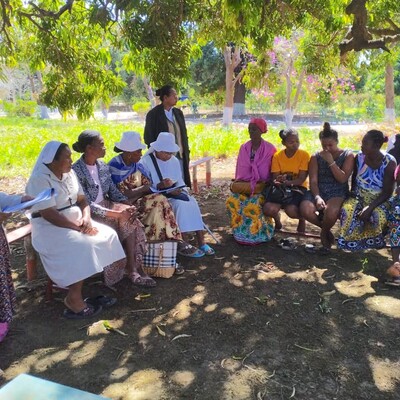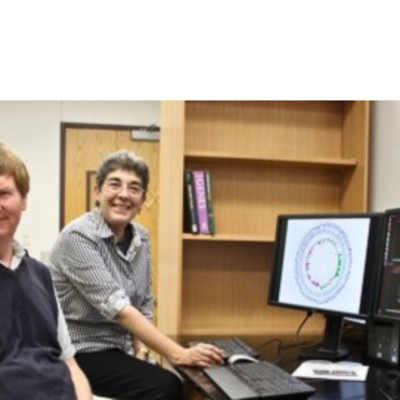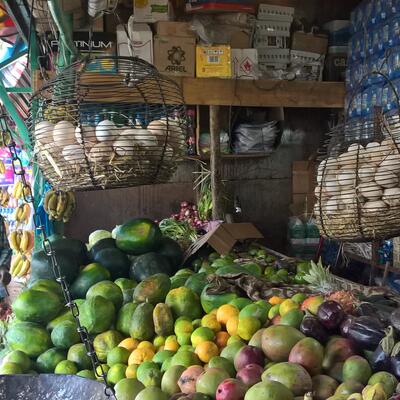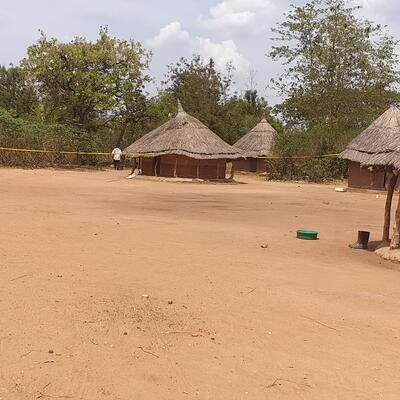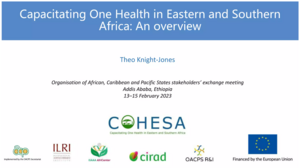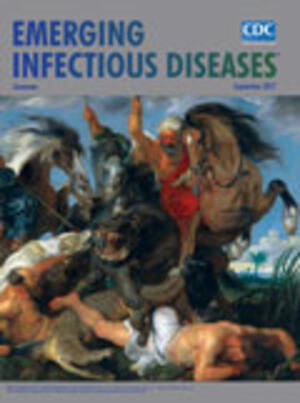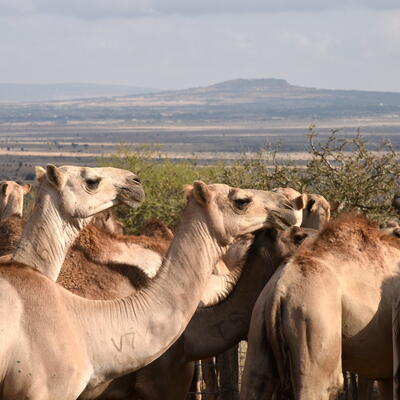
German agroecological livestock research investments are benefiting both people and the planet

(Left) ILRI Deputy Director General for Biosciences Dieter Schillinger welcomes to ILRI Parliamentary State Secretary to the German Federal Minister for Economic Cooperation and Development (BMZ) Maria Flachsbarth.
(Right) ILRI Assistant Director General Shirley Tarawali welcomes to ILRI BMZ Deputy Director General and Commissioner of the One World-No Hunger Initiative Stefan Schmitz (all photos here by ILRI/Paul Karaimu and ILRI/Susan MacMillan).
This information was provided by ILRI Assistant Director General Shirley Tarawali
The International Livestock Research Institute (ILRI) was honoured this week to host a high-level German delegation including Maria Flachsbarth, parliamentary state secretary to Germany’s federal minister for economic cooperation and development, and Stefan Schmitz, deputy director of the Federal Ministry of Economic Cooperation and Development (BMZ), as well as senior staff of the Kenya Ministry of Agriculture, Livestock, Fisheries and Irrigation, including Andrew Tuimur, chief administrative secretary, and Ann Onyango, agriculture secretary; and representatives from several other CGIAR centres working in Kenya, including Tony Simons, director general of the World Agroforestry Centre (ICRAF), and representatives from the Nairobi-based International Centre of Insect Physiology and Ecology (icipe).
This briefing gives an overview of the productive and decades-long relationship between Germany and the International Livestock Research Institute (ILRI), a partnership that over the years has involved many other research institutions, funding bodies and development agencies. ILRI and its predecessors, the International Laboratory for Research on Animal Diseases (ILRAD) and the International Livestock Centre for Africa (ILCA), have engaged with Germany on many strategic areas in livestock research for development in low-income countries, a few of which are outlined below.

Participating in the visit by a high-level German delegation to ILRI this week were: (top) Chief Administrative Secretary in the Kenya Ministry of Agriculture, Livestock, Fisheries and Irrigation Andrew Tuimur with Parliamentary State Secretary to the German Federal Minister for Economic Cooperation and Development (BMZ) Maria Flachsbarth; and (bottom) BMZ Policy Advisor Björn Niere and BMZ Deputy Director General Stefan Schmitz.
Highlights of German support for livestock research for development
From 2010 to 2017 funding from Germany supported 11 ILRI projects. Since 2013, Germany in addition has supported ILRI’s work on genetic resources and since 2017 Germany has supported ILRI forage genetics work through the Global Crop Diversity Trust. At present, there are two ongoing projects (excluding the genetic resources) supported by German funds and a large new program on climate-smart livestock is expected to begin shortly.
Of ILRI’s eight staff members from Germany and one from Austria, two are integrated experts from CIM (Centre for Integrated Migration and Development), a joint operation from GIZ (Gesellschaft für Internationale Zusammenarbeit, or German Society for International Cooperation) and the Germany Federal Employment Agency. Two other ILRI staff initially joined ILRI as CIM integrated experts. Germany has also supported a CIM integrated expert based at ILRI’s sister CGIAR centre in Nairobi, the International Center for Tropical Agriculture (CIAT), who works with the ILRI-led CGIAR Research Program on Livestock Agri-Food Systems to support work on forage seed systems. Three ILRI staff working on feed and forage development received their PhDs in Germany and are GIZ ‘returning experts’.
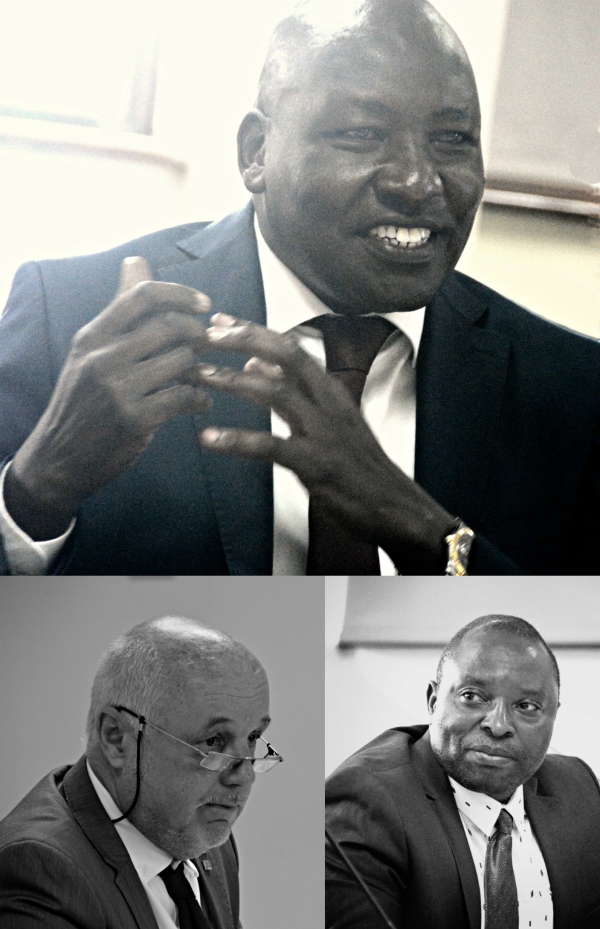
Participating in the visit by a high-level German delegation to ILRI this week were:
(Top) Chief Administrative Secretary in the Kenya Ministry of Agriculture, Livestock, Fisheries and Irrigation Andrew Tuimur
(Bottom left) Agriculture Program Director in Kenya for GIZ (the German international development agency Deutsche Gesellschaft für Internationale Zusammenarbeit) Mathias Braun and (bottom right) Regional Director for Africa at the International Potato Institute (CIP) Paul Demo.
Highlights of German-ILRI collaborative work
ILRI participation in GFFA 2018
In early 2018, ILRI participated in the Global Forum for Food and Agriculture 2018, ‘Shaping the Future of Livestock—Sustainably, Responsibly, Efficiently’, which was held in Berlin. In cooperation with Germany’s BMZ (Federal Ministry of Economic Cooperation and Development), GIZ and the Global Agenda for Sustainable Livestock (GASL), ILRI organized one expert panel at the forum on ‘Sustainable solutions for the livestock sector: The time is ripe!’. The panel speakers were Stefan Schmitz of BMZ and the One World–No Hunger initiative; Fritz Schneider of GASL, who gave an overview of livestock contributions to the sustainable development goals; Robin Mbae of the Kenyan Ministry of Agriculture, who discussed climate adaptations and mitigations in animal production; and Emma Naluyima, a mixed pig-and-crop farmer from Uganda, who told her personal story of how she used livestock for her household’s economic development. In addition, Jimmy Smith, director general of ILRI, served on a GFFA panel at the forum’s ‘Kick-off Event’ and on a ‘High-Level Panel of the European Commission’. ILRI also actively contributed to the drafting of a final GFFA Communiqué 2018, which was signed by the agricultural ministers of 69 nations.

Participating in the visit by a high-level German delegation to ILRI this week were:
(Top left) ILRI German scientists Nils Teufel and (right) Kristina Roesel
(Bottom left) Christoph Weber and (right) Lutz Merbold.
Green Innovation Centres for the Agriculture and Food Sector: Improving smallholder dairy production
The outcomes of the recently completed project ‘Innovative feed system management for improving smallholder dairy production’, which was financed under the Green Innovation Centres for the Agriculture and Food Sector, are twofold. The first major success story was training some 8000 smallholder dairy farmers, more than 30 per cent of whom were women, in agricultural practices ranging from animal husbandry to the preparation of dedicated forage plots and subsequent feed conservation in Western Kenya. The ‘train the trainers’ approach employed, which was based on four-week intensive training with defined theoretical and practical classes, was highly successful. Most of the original participants became trainers themselves shortly after the course ended and then proceeded to help train groups of second-level trainers. A training manual on smallholder dairy production was developed for this course. And a YouTube video on use of sweetpotato vines for silage for animal feeding was developed jointly by ILRI and the International Potato Centre (CIP). Efforts are under way to source funding for follow-up work involving more detailed training materials, a mobile phone application and a climate-smart assessment of the trainings.
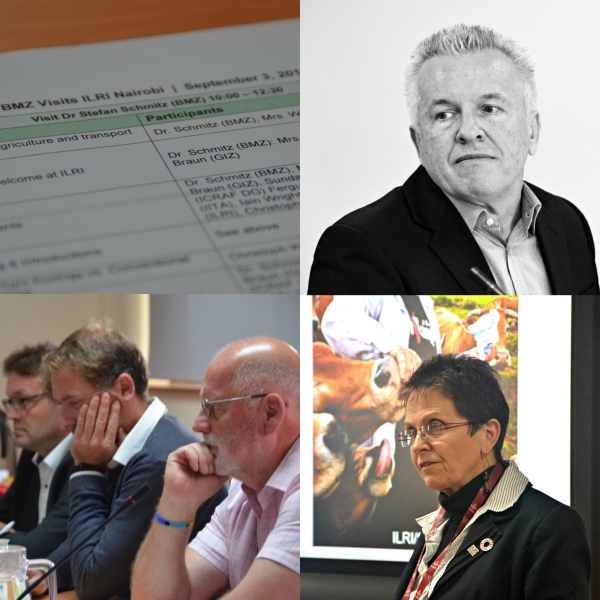
Participating in the visit by a high-level German delegation to ILRI this week were:
(Top right) World Agroforestry Centre Director General Tony Simons
(Bottom left) CIP German scientist Elmar Schulte-Geldermann and ILRI German scientists Lutz Merbold and Christoph Weber and (right) ILRI Assistant Director General Shirley Tarawali.
Identifying opportunities to mitigate greenhouse gas emissions from the livestock sector
An ongoing project to assess in situ levels of greenhouse gas emissions from livestock systems in East Africa and to quantify mitigation options is funded by BMZ’s Advisory Service on Agricultural Research for Development (BEAF) and carried out jointly with the German universities of Kassel and Hohenheim as well as the Karlsruhe Institute of Technology (KIT). This project is helping to answer three important questions:
(1) What is the current productivity and environmental footprint of existing livestock production systems in East Africa?
(2) What options promise to enhance the productivity of these livestock systems?
(3) How large are the potential climate mitigation co-benefits from production increases, that is, how much reduction can be expected in greenhouse gas emissions per kg of product?
To answer these questions, young dairy animals are studied in state-of-the-art analytical facilities to quantify simultaneous changes in productivity in terms of liveweight gains and levels of greenhouse gas emissions. These studies have already generated the first such in-situ data from African livestock systems.

Members of ILRI’s visiting high-level German delegation were given a tour of ILRI’s state-of-the-art laboratories at the Biosciences eastern and central Africa-ILRI (BecA-ILRI) Hub. Pictured top right is BMZ policy advisor Björn Niere and Elise Schieck, a German scientist at ILRI investigating Mycoplasma infections in cattle.
Developing new diagnostics and vaccines to combat contagious bovine pleuropneumonia (CBPP)
Contagious bovine pleuropneumonia (CBPP) is a highly contagious disease affecting millions of cattle in sub-Saharan Africa, where it remains one of the most important livestock infectious diseases. A conservative estimation of its economic impact in 2006 was estimated at USD34.8 million annual losses. Sensitive and specific diagnostic tests are important both to understand the true impact of the disease and to make decisions. ILRI and Germany’s Friedrich Loeffler Institute (FLI) have developed new diagnostic tests with better sensitivity and specificity. Discussions with private-sector companies for commercializing these tests are ongoing.


ILRI’s high-level German visitors this week toured ILRI’s BecA-ILRI Hub labs (top) and the ILRI Greenhouse (middle and bottom).
Vaccines to control African swine fever
African swine fever, caused by a virus, is a devastating disease for pig-holders in Africa. African swine fever is present in 26 countries in sub-Saharan Africa and has also become a major problem in Eastern Europe and Russia, where it is causing great economic losses. Worryingly, the virus recently spread to China, the biggest pig meat producer in the world. There is currently no vaccine to prevent this disease. Funded by BMZ, ILRI and FLI undertook a project titled ‘Modern approaches to development of vaccines for African swine fever control’. Among other outputs, this project has produced a deletion mutant virus that will be tested as a vaccine candidate in the near future. An immunization procedure using the virulent wild-type was also established. Recent funding from the International Development Research Centre (IDRC) is behind a new project between ILRI, the J Craig Venter Institute (USA) and FLI to set up genome editing (using CRISPR-Cas) procedures as well as a synthetic approach for constructing attenuated viruses as vaccine candidates.

The German delegation also visited ILRI’s Farm at its Nairobi headquarters, where they saw (top) this handsome Boran bull named ‘Tumaini’ (Swahili for ‘Hope’), which is the first African indigenous bovine animal to be cloned, while strictly following Kenyan and international biosafety standards, and (bottom) cattle grazing in the field.
Addressing food safety challenges
Foodborne disease is rising rapidly up the development agenda as information emerges on the huge health burdens caused by contaminated foods and as urbanizing and well-connected consumers get increasingly worried about the safety of their foods. Supporting smallholders and small-scale market vendors to produce safer food not only benefits consumer health but also safeguards livelihoods and incomes for these vulnerable value chain actors, many of whom are women. BMZ is one of the strongest and longest-standing supporters of research to make food in informal markets safer. As a result, dozens of graduate fellows have launched careers in food safety, tens of thousands of value chain actors have been trained and shown to produce safer food, and many promising interventions have been tested and are now being taken to scale (for example, insecticide-treated nets to reduce contamination by flies in meat markets). This work has been done in close collaboration with leading experts in food safety in German institutes including the Free University Berlin, the Federal Institute for Risk Assessment, the Friedrich Loeffler Institute and the University of Hohenheim.

BMZ Deputy Director General Stefan Schmitz (left) and Parliamentary State Secretary Maria Flachsbarth (right) lead their German delegation, now wearing ILRI lab coats and rubber boots, to the Mazingira Centre, ILRI’s environmental research facility, which is located on the ILRI Farm.
Safeguarding genetic resources
Germany has been a long-term supporter of the ILRI Forage Genebank, which maintains a collection of 18,635 germplasm accessions as a global public good. GIZ funds are used to support more efficient and effective conservation and use of forage diversity. Most of the current funding for this work (2017–2019) supports the genotyping of the forage collections for composition analysis and quality control. Sequencing data is being used to support improved management of the forage resources, including tracking genetic integrity and assembling information on gene flow, taxonomy, apomictic status (expression of asexual or clonal seed formation) and ploidy level (the number of sets of chromosomes in the nucleus—important for assessing biodiversity and isolating important plant genes) of the accessions. These activities are being implemented in collaboration with CIAT and partners in the CGIAR Genebank Platform as part of CGIAR’s global forage strategy.

(Top) ILRI scientist Lutz Merbold hosts BMZ Deputy Director General Stefan Schmitz (top) and Parliamentary State Secretary Maria Flachsbarth (bottom right) and their delegation at the Mazingira Centre, where he oversees the first-ever investigations of the levels of greenhouse gasses emitted by African livestock consuming typical African feeds.
Forage breeding and enabling forage seed systems
GIZ is a core partner of the CGIAR Research Program (CRP) on Livestock Agri-Food Systems, which is led by ILRI. The preliminary focus of this collaboration is building on earlier work in dual-purpose crop breeding and forage seed systems. A CIM integrated expert works in the Livestock CRP on developing sustainable public-private forage seed systems. With these efforts, a pipeline of more water efficient and nutritious forages has been maintained and appropriately scaled forage seed and feed business ventures have been developed to get these forages into the hands of farmers.
To spur development of a sustainable forage seed industry in Ethiopia, a FeedSeed project employed four business models tailored to the unique conditions faced by Ethiopia’s farmers, farmer cooperatives and private- and public-sector enterprises. Technical and business training was provided to selected prospective entrepreneurs who are now producing and selling different varieties of forage seed. Several studies provided information on the current system, the perceived value of best-bet forage species and on market pricing. A pilot public-private partnership model was tested, bringing together key stakeholders with a mandate and technical ability to support the growth of a sustainable forage seed industry. The project started a new business incubator involving 30 profitable private companies whose total annual seed sales started at USD20,000 and increased to USD400,000 after 2 years. With the help of the FeedSeed project staff, these companies also formed an industry group to regulate quality and promote branding.

(Top) Before departing ILRI, German Parliamentary State Secretary Maria Flachsbarth signs the ILRI guest book, with ILRI Deputy Director General for Biosciences Dieter Schillinger; (bottom) Schillinger and BMZ Deputy Director General Stefan Schmitz confer at the morning session of the German visit.
Access and benefits sharing
ILRI and a GIZ Access Benefit Sharing Initiative are working together on matters of access and benefit sharing compliance in ILRI research work in animal genetic resources. The collaboration includes developing awareness and compliance, technical support and capacity building. This work is conducted under a ‘Letter of Intent for Mutual Cooperation on Implementation of the Nagoya Protocol on Access to Genetic Resources and the Fair and Equitable Sharing of Benefits (ABS) Arising from Their Utilization to the Convention On Biological Diversity’, which was executed on 3 Mar 2017 and has been extended to 31 Mar 2022.

(Top) A group picture of the high-level German delegation visit to ILRI on 3 Sep 2018; (below) the group walks back up the hill from a tour of ILRI’s Farm and Mazingira Centre.
Selected key ILRI partners in Germany
Bundesinstitut für Risikobewertung (BfR) (Federal Institute for Risk Assessment)
Deutsches Institut für tropische und subtropische Landwirtschaft (DITSL) (German Institute for Tropical Agriculture)
Friedrich Loeffler Institute (FLI)
Freie Universität Berlin (FUB)
Humboldt-Universität zu Berlin
Karlsruhe Institute of Technology (KIT)
Kassel University
Landeslabor Berlin-Brandenburg (LBB)
Leibniz-Institut für Nutztierbiologie (FBN)
University of Hohenheim
University of Veterinary Medicine Hanover (TiHo)
Vétérinaires sans Frontìeres Germany (VSFG)






